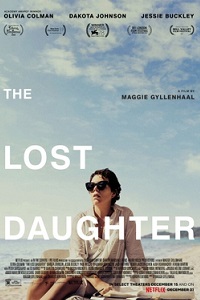♣♣♣♣/♣♣♣♣♣
University professor Leda Caruso (Olivia Colman) arrives at a beach in Greece and gets exactly what she has been needing: tranquility and solitude. She is welcomed by the resort caretaker Lyle (Ed Harris), with whom she will soon be flirting. However, her haven of peace and quiet is disturbed by the arrival of a group of boisterous tourists, among them Nina (Dakota Johnson) and her daughter Elena (Athena Martin). Leda easily gets fascinated with the young mother, seeing herself in her as she gets flashbacks of her struggles raising her own daughters. When Elena and her doll go missing, Leda becomes instrumental in finding them and strikes a budding friendship with some women in the group. However, this blossoming acquaintance is cut short as she is forced to deal with some inner demons of her own that end up clashing with her short-term decisions and unpopular opinions about motherhood.
Well, that’s depressing. The Lost Daughter opts to veer away from the usual caring mother roles as stereotyped in Hollywood and decides to present a different face of motherhood, one that is arguably a bit selfish and not what is traditionally dictated by society. Colman and Jessie Buckley, who portrays the role of younger Leda in flashbacks, do what they can to flesh out their character at different points of her life. What you get in the end is a flawed mother who will probably not be getting any Best Mom awards this year but will definitely get some brownie points for being unapologetically human.
The motherhood journey of Nina and younger Leda sort of parallel one another, which makes older Leda’s fascination with the former more understandable. In a way, it must feel like déjà vu to her, to witness another young mother threading a similar and risky path she once did. Nina acknowledges this similarity, becoming the very foundation of their relationship. She is looking for a mentor who can impart some much-needed wisdom but in the end she finds out that Leda is not really in a much better situation than hers.
I won’t pretend to know much about the topic. After all, it is evident that the overall theme of the narrative is all about motherhood. I am not a parent, and I will obviously never be a mother. While one can argue that the story can be viewed as a case study on parenthood in general, the only representative for men here are young Leda’s husband and Lyle who are supporting characters at best. The focus is, without a doubt, on Leda both young and old as well as Nina.
Nina appears to be tackling post-partum depression, lending some psychological perspective to the storyline. Young Leda, on the other hand, deals with a facet of motherhood that is becoming more and more common, which is the sacrifice women have to make in their careers in order to raise a family, something that has not really been much of an issue with men. The Lost Daughter is an honest take on what a mother should be based on societal norms vis-à-vis what some mothers want to be. In short, a debate on the normative role that women are expected to play in a fast-changing society.
In effect, The Lost Daughter as a title can be taken literally if based on Elena’s getting lost at the beach but from a more metaphorical standpoint, it can also be said that what is lost here is that once chance of a woman to be a mother to her daughters during their growing up years as she attempts to juggle building both a family and a career. Young Leda makes that clear. She is the cause. Old Leda is the effect, a walking bag of regrets.









0 creature(s) gave a damn:
Post a Comment